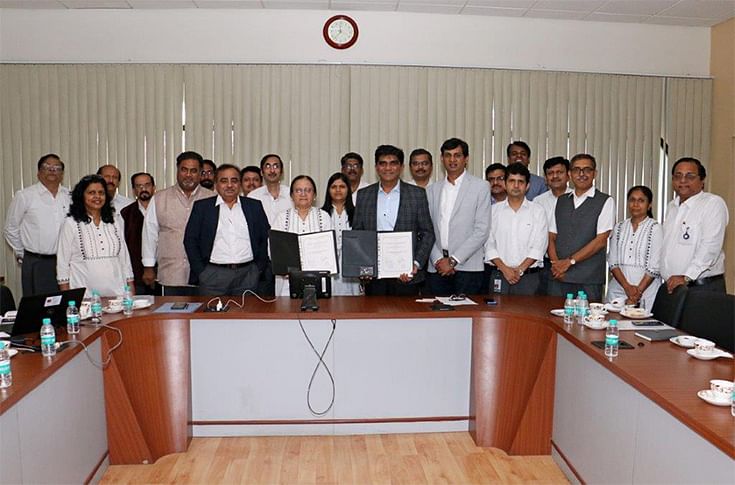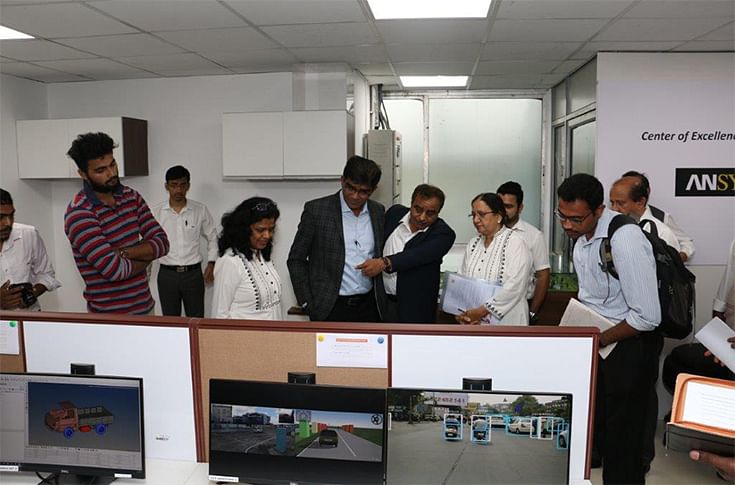Moving from Make in India to Innovate in India
Industry and academia collaboration is on the upswing in India. The recent one between ARAI and ANSYS, which aims to improve the transportation ecosystem, is a cue to similar partnerships in the future.
Many of the developed countries in the world are strutting ahead because of the innovations they export and not just the innovative products. This is evident if we glance at the World Intellectual property indicators where the US and China are leading. If India is aiming to become a $5 trillion (Rs 34,430,250 crore/ Rs 3.4 crore crore) economy, then the focus has to shift from Make in India to Innovate in India.
On the automotive front, connected mobility, autonomous cars, shared mobility, and electric mobility have become major disruptors globally. India needs to fill in a lot of gaps in the policy framework, infrastructure and resource management to establish a proper ecosystem for these disruptors. The start-ups, MSMEs and the established players need to stand in unison in order to accelerate the entire process. Experts in India have voiced their concern for developing test cases for intelligent vehicles in India, for India.

The signing of the MoU between ARAI and ANSYS for the Centre of Excellence at the ARAI campus. The CoE aims to make India's transportation system efficient and safe
The EV landscape is one area where India can be a pioneer for some in-house solutions and technologies and develop their own IPs. There are a lot of CoEs (Centre of Excellence) coming up across the country that is aimed at skilling India. One such CoE has been set up by ANSYS and ARAI at the ARAI centre in Pune. In an age where Denso and NXP Semiconductors are working on autonomous cars at their development centres in India, this CoE is working with some of the top academia including IITs to develop curriculums for EVs, ADAS and autonomous technology.
Rashmi Urdhwarashe, director of Automotive Research Association of India (ARAI), speaking at the inauguration of the new CoE with ANSYS, said, “In the first year of the CoE, we plan to make our own experts in the field of autonomous and electric mobility with the help of the technology, hardware, IP and the training provided by the experts from Ansys. We chose ANSYS as our partner because of its experience with all the ADAS and EV component manufacturers across the globe. ARAI is already in possession of the technology that is matured enough to demonstrate Level 2 autonomy."
"On the EV front, since the government is already taking the necessary initiatives for developing the charging infrastructure, we could see some major developments in the coming future. We are glad to see many Indian companies coming up with their own battery management systems which would prove quite critical for India’s EV story. We are also working on alternate battery chemistry and materials that would go into the cells. ARAI is also working on the recyclability of the material. Through our collaboration with ISRO, we are also working on battery sizing using the supercapacitors coupled with batteries,” she added
Speaking further on technology megatrends, Urdhwarashe said, “Societal acceptance of innovations such as the autonomous technology is what we plan to work on initially. This would help us to build on the used cases, simulating them and then working towards introducing the products.”
Due to the exposure that research institutes like ARAI get from such CoEs, the government regularly consults them during the framing of new policies such as the EV policies.
Rafiq Somani, area vice-president - India and South Asia Pacific at ANSYS said, “From the time when we were just a mechanical simulation company, we have come a long way in these 40 years due to our clients and partnerships with automotive, defence and research bodies like ARAI. It is because of these partnerships that these technologies get incubated and is made available as a commercial product for everybody. ANSYS has invested in 5G, electric EV, ADAS, digital twin technology and additive manufacturing.”

Simulation systems being demonstrated at the CoE in the ARAI campus in Pune.
The CoE at the ARAI centre in Pune will see research developments on the thermal management of lithium-ion battery pack for EVs, vehicle and systems integration for xEV technology demonstrator (2- & 3-wheelers, passenger cars, LCVs and others), evaluation of converted electric/hybrid electric vehicle using computer simulation, hybrid P3 retro-fitment solution for LCV-MT, backward and forward simulation for sizing and performance evaluation for xEV powertrain, autonomous vehicle development platform, EV-BMS, hybrid technology platform for 2 & 3 wheel vehicles, intelligent vehicle controller platform for the EVs. The CoE is promoting new innovations in electric mobility and advanced safety systems which would enable the industry with new innovations and skilled manpower.
Speaking on the adoption of the technologies for India, Somani says, “India can be an early adopter of the autonomous technologies but for cities, it would be difficult. In the EV front, this CoE will also help to develop some local EV batteries and hopefully with government incentives the prices of the EV batteries will come down drastically. We are working with some of the top academia to develop 5G. We are also looking to further leverage our collaboration with Bosch, SAP and PTC.”
Somani further opened up about the skill development initiatives from ANSYS: “There is an increased level of localisation in BS VI, infotainment and similar other things. However, these things are simply parts from China, assembled in India. India needs to innovate more, rather than just assembling the final product. This is why we have tied up with many of the academia which have their own incubation centres and a lot of in-house startup companies. This also allows us to take the help of the faculties there. A new trend that we have observed here is the enthusiasm from the next-gen suppliers who don’t just want to serve locally but globally. India has the manpower and the competencies, it is the intent of the centres like these to promote them and develop them on a global scale.”
ANSYS is working with Tier 1 suppliers to set up the ecosystem for EV and ADAS in India. ARAI, on the other hand, is also stressing on the safety aspects in the current transportation system. The CoE is also developing technologies that would aid the government in developing strategies towards achieving Vision Zero - no person should die on Indian roads. The centre is also working on a scientific action plan for specific cities that would improve the ambient air quality. The CoE will leverage its resources to innovate solutions and better the transportation system of India.
Also read: Spark Minda, Ansys inaugurate joint CoE at SMTC, Pune
RELATED ARTICLES
BKT, the ‘Off-Road King,’ Chases the Consumer Market
The company has unveiled a broad range of tyres for the Indian two-wheeler and CV markets.
RSB Group Prepares for Hyper-Growth: New Markets, Tech and Mission ₹10,000 Cr
From a small workshop in Jamshedpur to an engineering group with global reach, RSB Transmissions is preparing for its mo...
Beyond Helmets: NeoKavach Wants to Make Rider Airbags India’s Next Safety Habit
As premium motorcycles proliferate and riding culture evolves, an Indo-French venture is betting that wearable airbags, ...






 31 Jul 2019
31 Jul 2019
 27692 Views
27692 Views





 Shahkar Abidi
Shahkar Abidi


 Darshan Nakhwa
Darshan Nakhwa


